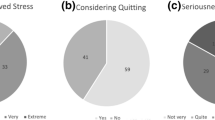Abstract
Stress is present in our lives wherever we go. Work-related stress, in general and teacher stress in particular, play a significant role in challenging teachers in their everyday activities. If stress is gone un-noticed and mismanaged over a prolonged period of time, it can seriously damage one's life or career ultimately leading to burnout or even worse. Causes of teachers’ stress can come from the fact that teachers teach the unmotivated, they don’t have a say in the teaching process, or lack resources. Symptoms of stress can be physical, psychological or behavioral that can lead the person to some serious and detrimental actions. Teachers need to be able to manage stress with the support of their family members, colleagues and school administrators. They need to set SMART goals, be positive, accept what cannot be changed and be willing to be flexible enough to accept help from others around them.
Access this chapter
Tax calculation will be finalised at checkout
Purchases are for personal use only
Similar content being viewed by others
References
Aldrup, K., Klusmann, U., & Ludtke, O. (2017). Does basic need satisfaction mediate the link between stress exposure and well-being? A diary study among beginning teachers. Learning and Instruction, 50, 21–30.
Argyle, M. (1964). Psychology and social problems. London: Methuen.
Blasé, J. (1982). A social-psychological grounded theory of teacher stress and burnout. Educational Administration Quarterly, 18(4), 93–113.
Blasé, J. (1986). A qualitative analysis of sources of teacher stress: Consequences for performance. American Educational Research Journal, 23(1), 13–40.
Boekaerts, M. (1993). Being concerned with well-being and with learning. Educational Psychologist., 28, 149–167.
Borg, M. G. (1990). Occupational stress in a British education setting: A review. Educational Psychology., 10, 103–126.
Brown, M., & Ralph, S. (1992). Towards the identification of stress in teachers. Research in Education., 48, 103–110.
Dunham, J. (1992). Stress in teaching (2nd ed.). London: Routledge.
Earp, J. (2010). A breeding ground for stress and burnout. Australian Teacher Magazine, 6, 16.
Geving, A. M. (2007). Identifying the types of student and teacher behaviors associated with teacher stress. Teaching and Teacher Education, 23, 624–640.
Guglielmi, R. S., & Tatrow, K. (1998). Occupational stress, burnout and health in teachers: A methodological and theoretical analysis. Review of Educational Research., 68, 61–99.
Hakanen, J. J., Bakker, A. B., & Schaufeli, W. B. (2006). Burnout and work engagement among teachers. Journal of School Psychology, 43, 495–513.
Ingersoll, R. M. (2001). Teacher turnover and teacher shortages: An organizational analysis. American Educational Research Journal, 38, 499–534.
Jarvis, M. (2002). Teacher stress: A critical review of recent findings and suggestions for future research directions. Stress News: The UK Journal of the International Stress Management Association, 14(1), 12–16.
Klassen, R., Wilson, E., Siu, A. F. Y., Hannok, W., Wong, M. W., Wongsri, N., & Jansem, A. (2012). Preservice teachers’ work stress, self-efficacy, and occupational commitment in four countries. European Journal of Psychology of Education, 28(4), 1289–1309.
Kokkinos, C. M. (2007). Job stressors, personality and burnout in primary school teachers. British Journal of Educational Psychology, 77, 229–243.
Kyriacou, C. (1987). Teacher stress and burnout: An international review. Educational Research, 29(2), 146–152.
Kyriacou, C. (2000). Stress busting for teachers. UK: Stanley Thomas Publishers Ltd.
Kyriacou, C. (2001). Teacher stress: Directions for future research. Educational Review, 53(1), 27–35.
Kyriacou, C., & Pratt, J. (1985). Teacher stress and psychoneurotic symptoms. British Journal of Educational Psychology., 55, 61–64.
McGrath, J. E. (1970). Social and psychological factors in stress. In J. E. McGrath (Ed.), A conceptual formulation for research on stress (pp. 10–21). New York: Holt, Rinehart & Winston.
Mizell, H. (2010). Why professional development matters. Oxford, OH, USA: Learning Forward.
Mueller, S. (2019). Stephen covey‘s time management matrix explained. Retrieved October, 22, 2019 from https://www.planetofsuccess.com/blog/2015/stephen-coveys-time-management-matrix-explained/.
Neves de Jesus, S., Miguel-Tobal, J. J., Rus, C. L., Viseu, J., & Gamboa, V. (2014). Evaluating the effectiveness of a stress management training on teachers and physicians’ stress related outcomes. Clinica Y Salud, 25, 111–115.
Popa, C., Laurian, S., & Fitzgerald, C. (2015). An insight perspective of Finland’s educational system. Procedia-Social and Behavioral Sciences Journal, 180(2015), 104–112.
Sandilos, L. E., Goble, P., Rimm-Kaufman, S. E., & Pianta, R. (2018). Does professional development reduce the influence of teacher stress on teacher– child interactions in pre-kindergarten classrooms? Early Childhood Research Quarterly, 42, 280–290.
Skaalvik, E., & Skaalvik, S. (2015). Job satisfaction, stress and coping strategies in the teaching profession: What do teachers say? International Education Studies, 8(3), 181–192.
Smith, A., Brice, C., Collins, A., Matthews, V., & McNamara, R. (2000). The scale of occupational stress: A further analysis of the impact of demographic factors and type of job (Contract Research Report 311/2000). Sudbury: Health and Safety Executive. HSE Books.
Sorenson, R. D. (2007). Stress management in education: Warning signs and coping mechanisms. Management in Education, 21(3), 10–13.
Srivastava, A., & Adams, J. W. (2011). Relationship between cynicism and job satisfaction: Exploration of mechanisms. Psychological Reports., 108, 27–42.
Sutton, R. I. (1984). Job stress among primary and secondary school teachers: Its relationship to ill being. Work Occupations., 11, 7–28.
Travers, C. J., & Cooper, C. L. (1996). Teachers under pressure: Stress in the teaching profession. London: Routledge.
Upton, G., & Varma, V. (Eds.). (1996). Stress in special educational needs teachers. Aldershot: Arena.
Wiley, C. (2000). A synthesis of research on the causes, effects, and reduction strategies of teacher stress. Journal of Instructional Psychology, 27(2), 8–87.
Yang, X., Ge, C., Hu, B., Chi, T., & Wang, L. (2009). Relationship between quality of life and occupational stress among teachers. Public Health, 123, 750–755.
Author information
Authors and Affiliations
Corresponding author
Editor information
Editors and Affiliations
Rights and permissions
Copyright information
© 2020 Springer Nature Switzerland AG
About this chapter
Cite this chapter
Abu-Rmaileh, S. (2020). Teacher Stress, Its Effects and Management. In: Coombe, C., Anderson, N.J., Stephenson, L. (eds) Professionalizing Your English Language Teaching. Second Language Learning and Teaching. Springer, Cham. https://doi.org/10.1007/978-3-030-34762-8_4
Download citation
DOI: https://doi.org/10.1007/978-3-030-34762-8_4
Published:
Publisher Name: Springer, Cham
Print ISBN: 978-3-030-34761-1
Online ISBN: 978-3-030-34762-8
eBook Packages: EducationEducation (R0)




